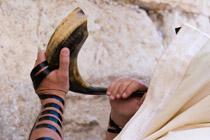 Print this Article
Print this Article

By Rabbi Moshe Pinchasi
Q: Do women have to hear the Shofar?
A: Women are exempt from hearing the Shofar as it is a time-bound positive Mitzvah[1]. However, the proper custom is that women come to the Bet Kenesset to hear Shofar[2]. One who is blowing only for women he should not recite a Beracha, nevertheless, it is permitted to carry the Shofar through Reshut HaRabbim on Yom Tov (although generally, completely unnecessary carrying is forbidden on Yom Tov as well)[3]. A woman who hears Shofar every year must continue to do so or conduct a Hatarat Nedarim[4].
Q: Is one allowed to sleep on Rosh HaShana?
A: The Rama cites the Yerushalmi that one who sleeps on Rosh HaShana will have a sleepy Mazal[5]. The Ben Ish Hai[6] and others write that therefore it is advisable to rise before dawn on Rosh HaShana, however, Hacham Ovadia Yosef writes that this is a great stringency[7].
The Ben Ish Hai also cites the Arizal[8] who allows sleeping after Hatzot. The Kaf HaHayim[9] relies on this leniency for the first day as well, as is the consensus of many Poskim[10]. The Poskim point out that one should utilize his waking hours to study Torah and recite the Sefer Tehillim[11].
Q: Why do some people fast on Erev Rosh HaShana?
A: Maran writes that the custom is to fast on Erev Rosh HaShana[12]. The Ben Ish Hai writes[13] that the reason for this fast is to break one’s heart before the Day of Judgement, so that he should do Teshuva. The Magen Avraham writes[14] that we fast because it is a special day when are Teshuva is accepted, and thus the fast will aid the acceptance of our Teshuva. The Kaf HaHayim writes[15], that in order for this to be a binding fast, one should accept it during Minha on the previous day. If one has fasted as a Neder every year, he must continue to do so, except for the occasion of a Se’udat Mitzvah[16].
Sources:
[1] שו”ע (או”ח סי’ תקפט ס”ג), ואף רשאות לתקוע (שם ס”ו). [2] חזו”ע (עמ’ קל), אול”צ (פ”ה סי”ז) [3] חיד”א בשו”ת יוסף אומץ (סי’ פב) ועוד אחרונים, דהעיקר כדברי הראשונים שהתירו בזה. [4] ואם שנה אחת נאנסה שאינה יכולה לבוא לבית הכנסת מחמת חולי וכדו’, י”א (חזו”ע שם) שאם אפשר יבוא התוקע לביתה וישמיע לה קול שופר, וי”א (אול”צ שם) שאין לה להטריח את התוקע שיבוא אליה כלל. [5] דרכי משה (סי’ תקפג אות ב) וכ”פ ברמ”א (שם ס”ב). [6] ש”א פר’ נצבים סי”א [7] חזו”ע (עמ’ קפג) [8] שער הכוונות (דף צ ע”א) [9] שם אות לו [10] חזו”ע (שם) אול”צ (פ”ד ס”ח) ועוד [11] ע’ בכה”ח (שם אות לח) שנוהגים לגמור כל התהלים בר”ה, ועוד כ’ (הקדמה לשו”ת צדקה ומשפט לגאון ר’ צדקה חוסין) שהיו נוהגים לקרא בכל יום את כל ספר התהלים, ובשני הימים יהיה מנין הפרקים עולה כמנין ‘כפר’. [12] סי’ תקפא ס”ב [13] ש”א בהקדמה לפר’ נצבים [14] סק”ט [15] שם ס”ק סג, , ובאול”צ (ח”ד פ”ב ס”א) כ’ כדברי הכה”ח ושראוי לכל ירא שמים להתענות בערב ר”ה, ואף בחזו”ע (הל’ ימים נוראים עמ’ מו) כ’ שיש נוהגים להתענות בער”ה [16] כ’ חזו”ע (שם עמ’ נ), כי על דעת כן נהגו מעולם. אך באול”צ (שם ס”ג) כ’ שאם קיבל עליו תענית, צריך לעשות התרה על קבלתו ויאכל.